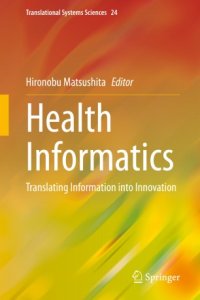
Ebook: Health Informatics: Translating Information into Innovation
Author: Hironobu Matsushita
- Tags: Business and Management, Health Care Management, Sustainability Management, Risk Management, Innovation/Technology Management, Operations Research/Decision Theory
- Series: Translational Systems Sciences 24
- Year: 2021
- Publisher: Springer Singapore
- Edition: 1st ed.
- Language: English
- pdf
This book is the first to approach healthcare informatics from the perspective of innovation. Drawing on the unique pairing of information and innovation, it offers an analysis to help readers rethink information technology, knowledge management, interprofessional collaboration and the generation of wisdom in the context of healthcare.The concept of “translational” research stems from the medical and health sciences, and features bidirectional and recursive information-generation processes involving bed-to-bench and bench-to-bed approaches. Based partly on this, translational systems science has become a new trend within systems sciences, motivated by the need for practical applications that help people by offering holistic systems solutions for complex ideas. Today, numerous innovations are emerging in diversified clinical practices, and there has been a remarkable convergence of new technologies in disciplines like genome therapy, immunotherapy, iPS cells, imaging diagnosis, personalized medicine, molecular targeted drugs, surgical robots, and remote nursing. Innovation is also occurring in health management fields, including health records, insurance reimbursement methods, quality control, and safety. In these areas, big data and machine learning are accelerating innovation. Behind these innovations are the creation, sharing, bridging, and translation of data, information, knowledge, and wisdom, and as such health informatics is critical in promoting health innovations.The book explores the horizons of health informatics, introducing cutting-edge practical cases and theoretical frameworks, including but not limited to fields such as big data, machine learning, drug discovery, interprofessional collaboration, electronic health records, robotics, telenursing, quality improvement, and safety.